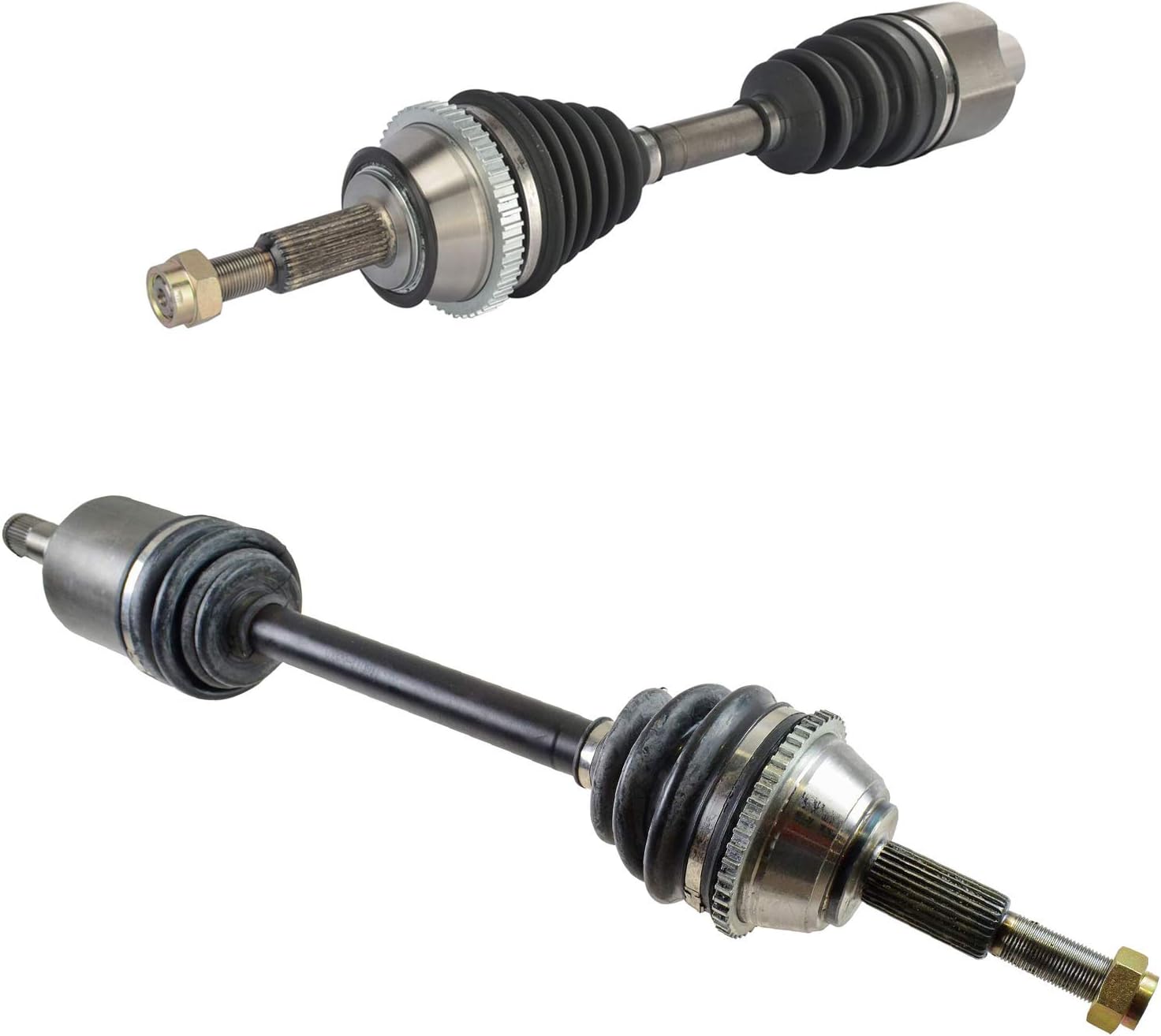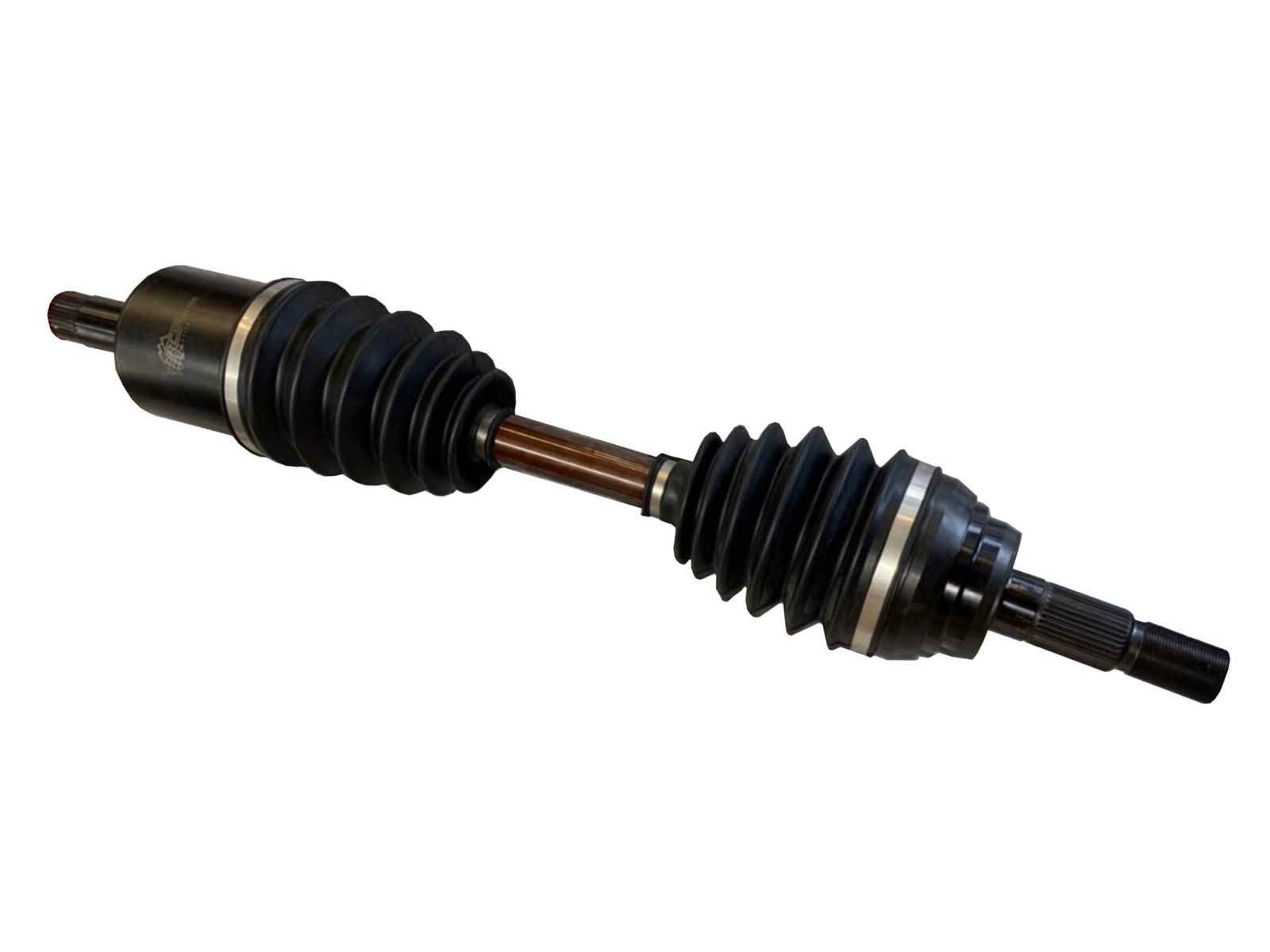Product Description
Company Profile
Our company have been producing axles more then 10 years,and our axles were sold many countires.we have good price and quantity.
Main products:
Germany Axle, English Axle, American Axle, Bogie Suspension, half axle, Suspension
Parts, fifth wheel, kingpin and other trailer parts.
Product characteristics:
1. Specifical heat-treat, low-alloy steel axle beam, it has the vitues of good synthetic performance, strong load ability and lower self weight.
2. High quality alloy solid inserted spindle, through wholy heat treatment, provide superior fatigue capability
3. High performance premiun non-asbestos brake linings, extend service life
4. Easy fir ABS installation
5. Camshaft, matching with special seals, can ensure no entry of the grease into the brake drum, more safety
6. New tight fit hub cap have O rings, high property for sealing
7. Grease lubricant is supplied by Mobil that lengthens the time of free maintance
8. Full range of stud fixing such as ISO, BSF and JAP, it can meet the requirements of various wheel rims
9. Through ISO9001: 2015 certification and ISO/TS16949 we faithfully follow the stipulations of this standard
So as to guarantee high product quality.
About us
HangZhou Jinlibo Industry and Trade Co., Ltd. Manufacture and supply trailer axle and related parts for
Many years. Welcoming interested compaines around the world to cooperate with us.
HOPE WE HAVE A GOOD COOPERATE.
Product Parameters
| THAILAND AXLE | ||||||||||
| AXLE MODEL | BRAKE SIZE | WHEEL FIXING | NOxSIZE OF WHEEL STUD(DIM A) | WHEEL REG.DIA(DIM B) | DIM D | WHEEL RIM SIZE | BEAM SIZE | TRACK LENGTH(DIM C) | AXLE CAPACITY | SPRING SEAT INSTALLATION |
| SWS1318J | 420×180 | JAP | 8XM20X285 | 221 | 722.5 | 7.50-20” | square150 | 1850MM | 13T | <=450 |
| SWS1318i | 420×180 | ISO | 10XM22X335 | 281 | 722.5 | 7.50-20” | square150 | 1850MM | 13T | <=450 |
| SWS2571I | 420×220 | ISO | 10XM22X335 | 281 | 722.5 | 7.50-20” | square150 | 1850MM | 20T | <=450 |
Production Workshop
Product Description
Exhibition
Certifications
FAQ
Q1:Are you a factory?
A:Yes,we are a factory,but not just a factory,as we have sales team,our own offices,and they
all can help the buyers and cooperative partners to decide which products are the best choices
for them,and all your requirements and inquires will be replyed in time.
Q2:What’s your Delivery Time?
A:In general, the delivery time is 15-20 days.We will make the delivery as soon as possible with
the guaranted quality.
Q3:What is the convenient way to pay?
A:L/C , T/T,Unionpay,DP are accepted,and if you have a better idea , please be free sharing with us.
Q4:Which type of shipping would be better?
A:Generally,in consideration of the cheap and safe superiorities of sea transportation,we advice
to make delivery by sea.What’s more, we respect your views of other transportation as well.
/* March 10, 2571 17:59:20 */!function(){function s(e,r){var a,o={};try{e&&e.split(“,”).forEach(function(e,t){e&&(a=e.match(/(.*?):(.*)$/))&&1
| Condition: | New |
|---|---|
| Axle Number: | 1 |
| Application: | Trailer |
| Certification: | CE |
| Material: | Steel |
| Type: | Rear Axles |
| Customization: |
Available
| Customized Request |
|---|

Are there guidelines for choosing the right axle for towing heavy loads?
When it comes to towing heavy loads, selecting the appropriate axle is crucial for ensuring safe and efficient towing performance. While the specific guidelines may vary depending on the vehicle and towing requirements, there are general considerations to keep in mind when choosing the right axle. Here’s a detailed explanation of the guidelines for selecting the right axle for towing heavy loads:
Gross Axle Weight Rating (GAWR):
One of the primary factors to consider is the Gross Axle Weight Rating (GAWR) provided by the vehicle manufacturer. The GAWR specifies the maximum weight that an axle is designed to support safely. It is essential to ensure that the selected axle’s GAWR is sufficient to handle the anticipated weight of the loaded trailer and any additional cargo or passengers in the towing vehicle. Exceeding the GAWR can lead to axle failure, compromised handling, and safety risks.
Towing Capacity:
Check the towing capacity of your vehicle, which represents the maximum weight that the vehicle is rated to tow. The axle’s capacity should align with the towing capacity to ensure safe and efficient towing. Consider the type and size of the trailer you intend to tow, including its loaded weight, tongue weight, and any weight distribution considerations. The axle should be capable of handling the anticipated load without exceeding its capacity.
Matching Axle and Suspension:
The axle and suspension system work together to support the weight of the vehicle and the trailer being towed. It is important to ensure that the axle and suspension are properly matched to provide adequate support and stability. Consider the type of suspension (leaf springs, coil springs, air suspension) and the axle’s design (solid axle, independent suspension) to ensure compatibility and optimal towing performance.
Braking System:
When towing heavy loads, the braking system plays a critical role in maintaining control and safety. Ensure that the axle is equipped with appropriate brakes that can handle the increased load. Consider the type of brakes, such as electric brakes or hydraulic brakes, and their capacity to provide sufficient stopping power for the combined weight of the towing vehicle and trailer.
Weight Distribution:
Proper weight distribution is essential for safe towing. The axle should be selected based on the anticipated weight distribution between the towing vehicle and the trailer. Consider factors like tongue weight and the use of weight distribution hitches or sway control devices to ensure balanced weight distribution and optimal handling characteristics.
Consult Manufacturer Recommendations:
Always refer to the vehicle manufacturer’s recommendations, specifications, and guidelines when selecting an axle for towing heavy loads. The manufacturer’s guidelines will provide accurate and vehicle-specific information to help you make the right choice. Consult the owner’s manual or contact the manufacturer directly for any specific towing-related recommendations.
It’s important to note that towing requirements and axle specifications can vary depending on the vehicle make and model, as well as regional regulations. It is advisable to consult with automotive experts, such as mechanics or dealerships, who have expertise in towing and can provide specific recommendations based on your vehicle and towing needs.

Are there specific maintenance tips to extend the lifespan of my vehicle’s axles?
Maintaining the axles of your vehicle is crucial for ensuring their longevity, performance, and overall safety. Here are some specific maintenance tips to extend the lifespan of your vehicle’s axles:
- Regular Inspection:
- Lubrication:
- Seal Inspection and Replacement:
- Proper Loading and Towing:
- Driving Techniques:
- Regular Wheel Alignment:
- Proper Tire Inflation:
- Service Intervals:
Perform regular visual inspections of the axles to check for any signs of damage, leaks, or excessive wear. Look for cracks, bends, or rust on the axle housing, and inspect the axle shafts, seals, and boots. Early detection of issues can help prevent further damage and costly repairs.
Follow the manufacturer’s recommendations for axle lubrication. Proper lubrication helps reduce friction and wear on the axle components. Regularly check the axle’s lubricant level and quality, and replace it as necessary. Use the recommended lubricant type and viscosity for your specific axle.
Check the axle seals for any signs of leaks, such as fluid accumulation around the axle ends. Leaking seals can allow contaminants to enter the axle assembly, leading to premature wear and damage. Replace worn or damaged seals promptly to maintain proper lubrication and prevent contamination.
Ensure that you do not exceed the weight capacity of your vehicle’s axles. Overloading or towing beyond the recommended limits can put excessive stress on the axles, leading to premature wear or failure. Be mindful of the payload and towing capacity specified by the vehicle manufacturer.
Adopt proper driving techniques to minimize stress on the axles. Avoid sudden acceleration, aggressive cornering, and harsh braking, as these actions can subject the axles to excessive forces. Additionally, be cautious when driving over rough terrain or obstacles to prevent impacts that could damage the axles.
Maintain proper wheel alignment to prevent excessive strain on the axles. Misaligned wheels can put uneven loads on the axles, leading to accelerated wear. Regularly check and adjust the wheel alignment as per the manufacturer’s recommendations.
Ensure that your vehicle’s tires are properly inflated according to the recommended tire pressure. Underinflated or overinflated tires can affect the load distribution on the axles and increase the risk of axle damage. Regularly check and maintain the correct tire pressure.
Follow the recommended service intervals for your vehicle, which may include axle inspections, lubricant changes, and other maintenance tasks. Adhering to these intervals ensures that the axles are properly maintained and any potential issues are addressed in a timely manner.
It’s important to consult your vehicle’s owner’s manual for specific maintenance guidelines and intervals provided by the manufacturer. Additionally, if you notice any unusual noises, vibrations, or handling issues related to the axles, it is advisable to have your vehicle inspected by a qualified mechanic to identify and address any potential axle problems promptly.

Are there aftermarket axles available for upgrading performance in off-road vehicles?
Yes, there are aftermarket axles available for upgrading performance in off-road vehicles. Off-road enthusiasts often seek aftermarket axle options to enhance the durability, strength, and performance of their vehicles in rugged and demanding terrains. Here’s some information about aftermarket axles for off-road applications:
1. Upgraded Axle Materials:
Aftermarket axles are typically made from high-strength materials such as chromoly steel or forged alloys. These materials offer superior strength and durability compared to stock axles, making them better suited for off-road use where extreme loads, impacts, and torsional forces are encountered.
2. Increased Axle Shaft Diameter:
Some aftermarket axles feature larger diameter shafts compared to stock axles. This increased diameter helps improve the axle’s load-carrying capacity and resistance to bending or torsion. It can also enhance the overall durability and reliability of the axle in off-road conditions.
3. Upgraded Axle Splines:
Axles with upgraded splines are designed to handle higher torque loads. Aftermarket axles may feature larger and stronger splines, providing increased power transfer capabilities and reducing the risk of spline failure, which can occur in extreme off-road situations.
4. Locking Differentials:
Some aftermarket axle options include integrated locking differentials. Locking differentials improve off-road traction by mechanically locking both wheels on an axle together, ensuring that power is distributed evenly to both wheels. This feature can be advantageous in challenging off-road conditions where maximum traction is required.
5. Lifted Vehicle Compatibility:
Aftermarket axles are often designed to accommodate lifted vehicles. Lift kits that raise the suspension height can impact the axle’s operating angles. Aftermarket axles may offer increased articulation or modified geometry to maintain proper alignment and reduce the risk of binding or premature wear.
When considering aftermarket axles for off-road vehicles, it’s essential to choose options that are compatible with your specific vehicle make, model, and suspension setup. Working with reputable manufacturers, consulting with experienced off-road enthusiasts, or seeking advice from professional mechanics can help you select the most suitable aftermarket axle upgrades for your off-road needs.
Lastly, it’s important to keep in mind that upgrading axles alone may not be sufficient for maximizing off-road performance. Other components such as suspension, tires, differential gears, and drivetrain systems should be considered as part of a comprehensive off-road build to ensure optimal performance, reliability, and safety.


editor by CX 2024-02-10